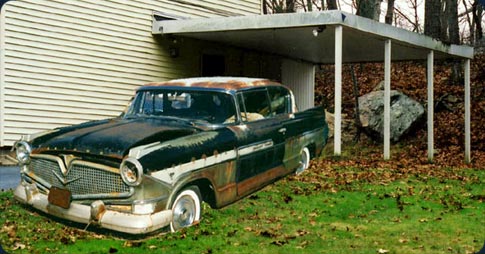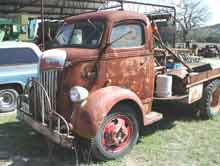Wayne Graefen’s been out carousing again. This time he’s come up with a bull-nosed beauty not far from his Texas hacienda. When I was young there were lots of these cab-over-engine trucks around, “Cab Overs” we called them, or sometimes “COE;” some people called them “cab forward,” but I never did. Now they’re a figment of the past. This truck has been identified by Rich Miller, an early Ford V8 enthusiast with a rich knowledge, as Body Style 80 from the 1941-47 era – they looked virtually the same for that entire period. Built on wheelbases from 101 to 158 inches, they carried a myriad of model numbers, all ending in “W.”
The reason for mounting the cab so high is obvious. By putting it over the engine, or nearly so, it’s possible to make a shorter, more maneuverable truck for a given payload. The
chassis (this one’s actually a ’39) is downright stubby, much shorter than would be required for a
conventional cab. The skybox, where the
driver and passenger sit, suffers an intrusion by the engine, and the shift lever is canted forwards, since the transmission is actually behind the driver. Rich says that the Ford Cab Overs feature a “nice roasty-toasty cabin for those chilly nights and early morning hauls,” but on “brow-sweating summer days on runs grinding up the
highway with the windshields pushed out for maxium ventilation” the
side ventilators on the cowl were “essential once the engine heat got too
unbearable.”
Cab Overs arose during the 1930s, and most truck manufacturers, Ford, Chevy, GMC, Dodge,
Studebaker, had them, right through into the 1950s. Internationals were among the most streamlined of the early COEs. The Cab Over trucks most unusual in the USA may be the Canadian Military Pattern made in Canada by both
Ford and General Motors during World War II for use overseas.
Why don’t we have Cab Over Engine trucks any longer? In the 1950s, several manufacturers moved the engine aft and the cab further forward, putting driver and passenger closer to the ground. The “Tilt Cab” (for that’s how you get at the engine) models from Ford appeared in
1957, and International, had them too. I call them “flat-fronts.” The idea quickly caught on, and by 1960, almost every truckmaker had made the switch. Thus the Cab Over passed into history.

